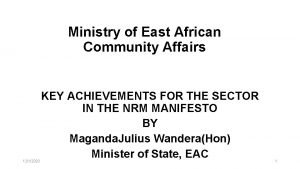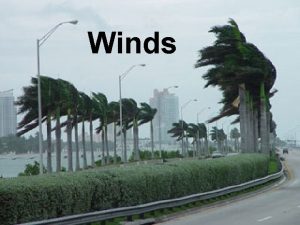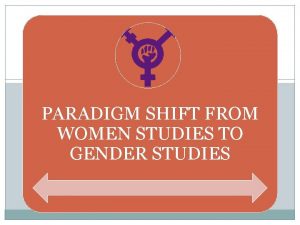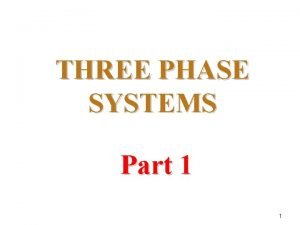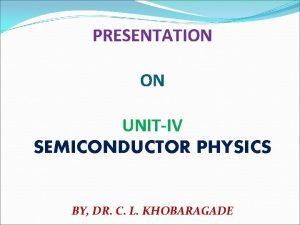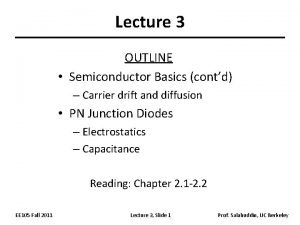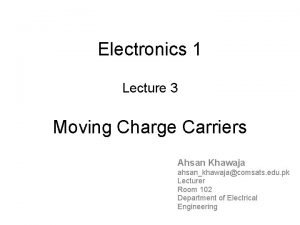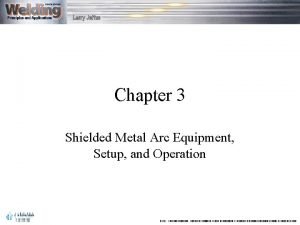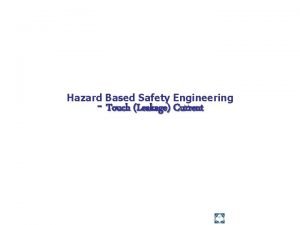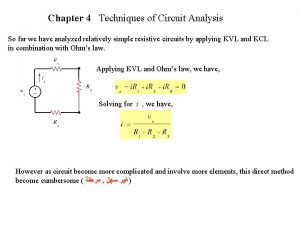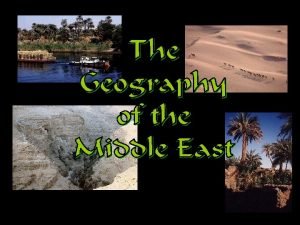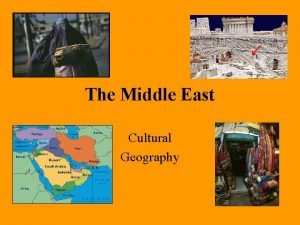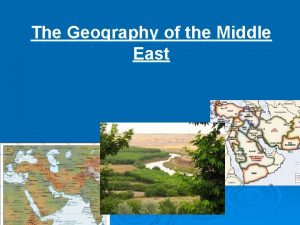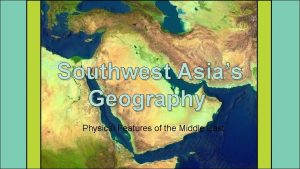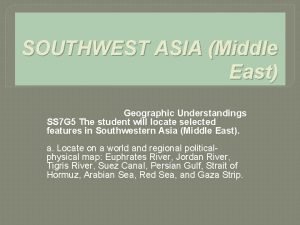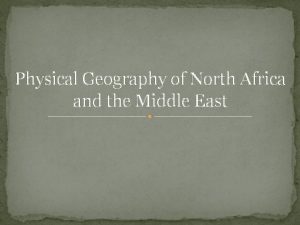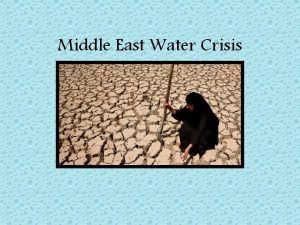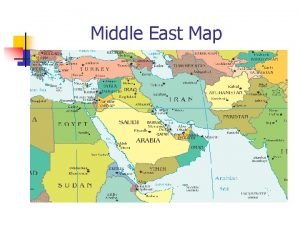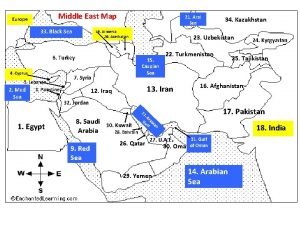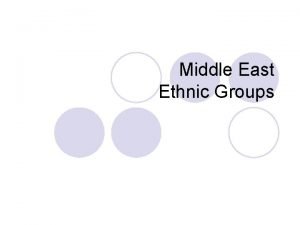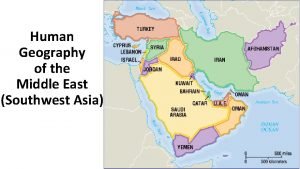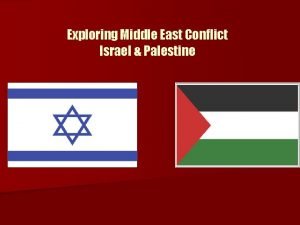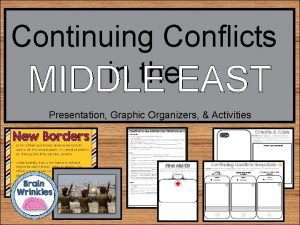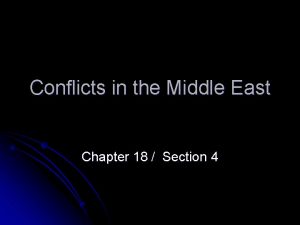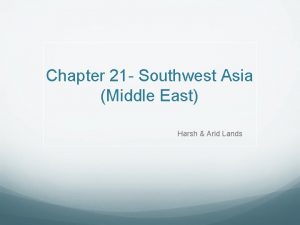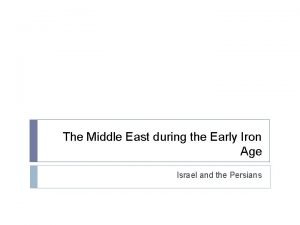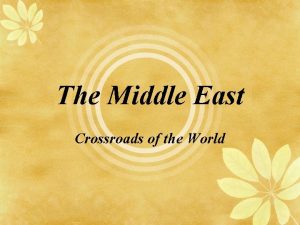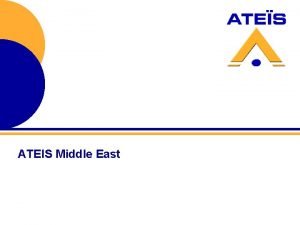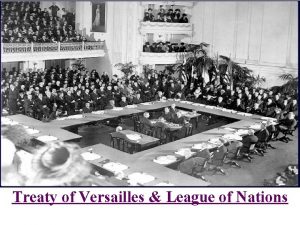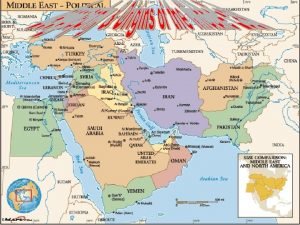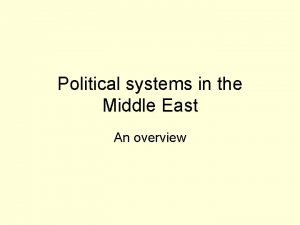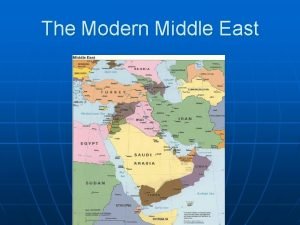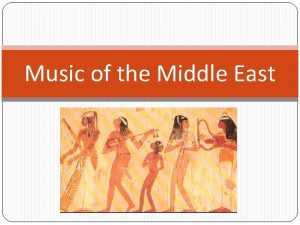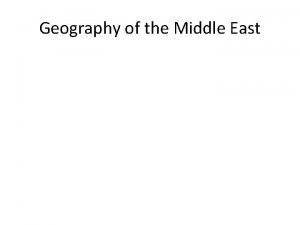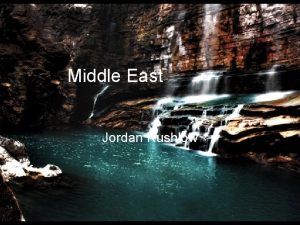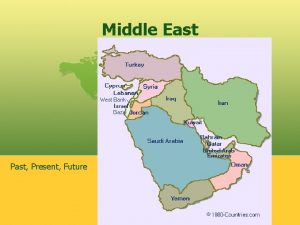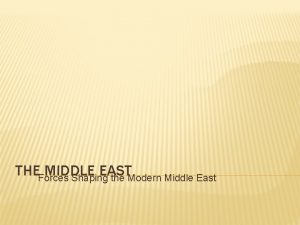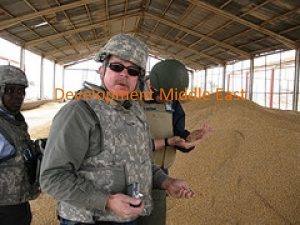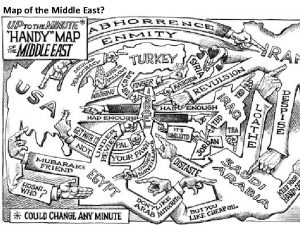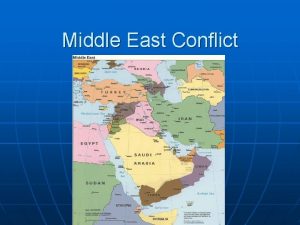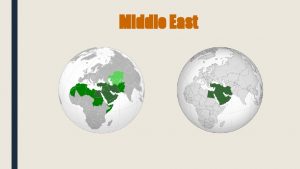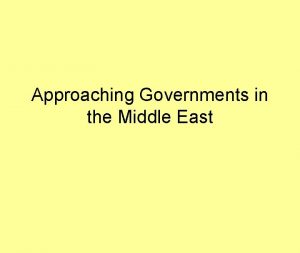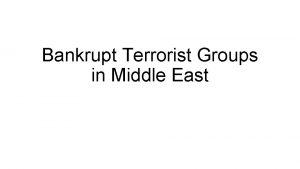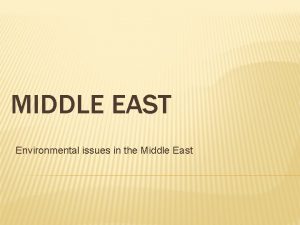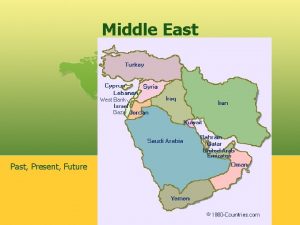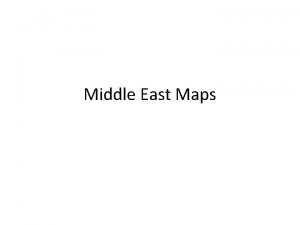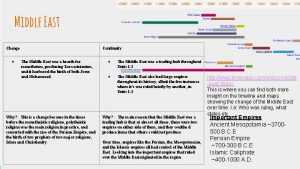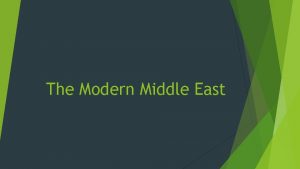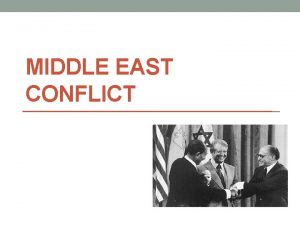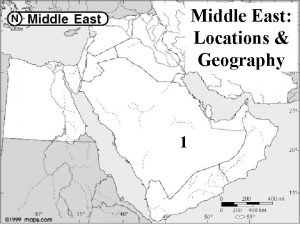Teaching Current Affairs in Middle East Studies MorningMeeting












































- Slides: 44

Teaching Current Affairs in Middle East Studies

��“Morning”Meeting Find a spot in the circle and grab a card from the pile. 2

“ Yesterday I was clever, so I wanted to change the world. Today I am wise, so I am changing myself. Probably not Rumi -Rumi 13 th-century Persian Sunni Muslim poet, jurist, Islamic scholar, theologian, and Sufi mystic. 3

�� Salam! Janel Anderson High School Social Studies Teacher Middleton High School (Middleton Wisconsin) Graduate Studies Faculty University of Wisconsin-La. Crosse You can find me at janderson@mcpasd. k 12. wi. us 4

But also. . . 5

Big Picture for Our Session “Morning” Meeting (Responsive Classroom) 1. Morning Message 2. Greeting - the languages of the Middle East 3. Activity “This is a…” 4. News & Announcements Relationships Matter! Building a trusting Classroom Community Helps us Teach Part 1: “Specialness” of Middle Eastern Representation in the Curriculum Part 2: The Importance of Media LIteracy Part 3: Using Current Events to Create Dynamic Instruction “Papa Bessma” & his Granddaughter Nallla 6

Review of Materials Teaching About the Wars by Jody Sokolower Rethinking Schools http: //www. choices. edu/curricul um-unit/responding-terrorismchallenges-democracy/ The Middle East in Transition: Questions for US Policy The Choices Program Brown University http: //www. choices. edu/curriculumunit/middle-east-transitionquestions-u-s-policy/ 7

Big Picture for Our Session Processing Planning for What We’ve What’s Next: New & Improved Learned Heavy Heads -& Hopeful Hearts Instructional Leadership “Papa Bessma” & his Granddaughter Nallla 8

Find “Your People” Move into small groups based on the age level and subjects that you teach. Summer School Students in Madrasa Fez Morocco 9

Discussion with “Your People” What are the considerations or issues that are important to recognize when studying current events with your students? Local Politics? Age/Developmental Stage? Classroom demographics? The friendliest man (with the dirtiest English) at the bus stop. (Rabat Morocco) 10

2 minutes In Your Table Teams… Gather as many CURRENT EVENTS stories about the Middle East as you can! Write them down! Most stories collected WINS! GO!

War What do we know now… What does this mean for our classrooms? Media Coverage of the Middle East violence Instability 12

What do kids know about the Middle East? If you asked your students what they know - what do you predict they would say? 13

What do kids know about the Middle East? Think Pair Share https: //www. primarysource. org/forteachers/podcasts/episode-one 14

15

Part 1: The “Special-ness”of Teaching Current Affairs in Middle East Studies Confronting the “Single Story” Build Critical Content with Courage Knowledge ○ Dispelling Myths so you can talk about what is truly interesting ○ Making yourself and your students aware of bias ○ Students want teachers who teach “against the textbook” ○ You’re here! (Now Keep Going) ○ What Resources exist in your communities? ○ ○ Universities & Cultural Centers Travel & Experiences that will make you confident and competent 16

Part 1: Building Critical Content Knowledge What have you learned HERE so far? ○ ○ ○ Think Pair/Partners Share What are the BIG CONTENT take-aways you have gathered from being here? How has this workshop built your content knowledge? 17

Content Take-Away… so far. Teach ME studies from ME perspective Humanize - don’t just tteach what the media says Danger of the single story Just as o think ofyou story is special so do others Connect with the humnaity of others seeing differences but still seeing similarities 18

Knowing the Content… Buckle Up. 19

Pick a Question you don’t know the answer to. . . What can you find out in 4 minutes? 20

● What’s the deal with East Jerusalem? ● Why don’t Iran and Saudi Arabia get along? ● Why is Russia siding with the Assad regime in Syria? ● What is Israel’s “Nation State Law”? ● Is the crown Prince of Saudi Arabia a real reformer? ● What is the tension between Canada and Saudi Arabia about? ● Why is there tension between Qatar and most other Gulf States? ● Whose side is the US on in the War in Syria? ● Does the US rely on oil from the Middle East or what? 21

1 Resources! The stuff you want!

Part 1: Building Critical Content Knowledge Choices “The Middle East in Transition” Choices Program - Brown University Middle East Resources Page At your tables - Read/Review your assigned section. Prepare a short description/Overview for the group. How could this be used for: Elementary classrooms Middle/High School Teacher Training 23

Part 1: Building Critical Content Knowledge Teaching the Wars Rethinking Schools 24

Part 1: Building Critical Content Knowledge Primary Source: What Teachers Need to Know about the Middle East Episode #1: What and Where is the Middle East, Anyway? Episode #6: The Diversity of Islam Episode #2: Underneath the Veil Episode #7: Water and War in Yemen Episode #3: Media Literacy & the Middle East Episode #4: Syria, Explained Episode #5: The Saudi-Iran Cold War Episode #8: Arab Youth & Youth Activism Episode #9: Learning from Refugees Episode #10: Teaching about Iraq, a State in Flux 25

Part 1: Building Critical Content Knowledge Videos & On-Line Film Sources Vox World TRT World Now This World The Economist Visual Politc Caspian Report Kurgestagt - In a Nutshell 26

Part 1: Building Critical Content Knowledge Other things I think you would love… 27

Part 1: Building Critical Content Knowledge Teacher Travel & Professional Development Grants Qatar Foundation Fulbright Hays National Council on US-Arab Relations International Schools IREX (Teachers for Global Classrooms) National Endowment for the Humanities GEEO University Programs Rotary “ 24 Teacher Travel Opportunities” 28

Part 2: Media Studies & Literacy Part 2: Media Studies/Literacy Teaching students to “read” the news like they read a book: 1. Who is writing this story? 2. Why are they telling this story? 3. What voices are missing? 29

Part 2: Media Studies & Literacy Getting Kids to “Read” the News Daily News Summary 30

Can you Corroborate That? 1. Read the article provided (choose a story you don’t think your students already know). Use the worksheet provided to: Annotate the story using a Current Events Summary Sheet 1. As a group look for 2 additional articles on this story. 1. How much of the original story information is the same? 31

32

New Sources Place your screenshot here George Washington University 33

our office 34

Part 3: Ideas for Dynamic Curriculum for Middle East Studies ○ Global Studies - Best & Worst Practices ○ Resources ○ Using Current Events ○ Connections with What we know ○ Research ○ Discussion ○ Projects 35

Things to Consider When Planning Instruction on Modern Middle East. . . Bring the attention of your audience over a key concept using icons or illustrations 36

Leading w 9/11 Setting the framework of discussing the middle east by starting with 9/11 is problematic for a number of important reasons. �� The Power of Israel & Palestine This issue is critical and complex and in many ways shapes the lense through which people in the region see world events. The Problem with “Good” News Exclusive focus on “good” news is biased in the same way as “bad” news focused curriculum. 37

The Big List of Class Discussion Strategies The Cult of Pedagogy Tips for Success in Classroom Discussion 1. Nurture a Safe Environment 2. Send them in Prepared - Give them time to research & think. 3. Remind Students that Silence is OK 4. Allow for Supportive Partner Discussion Teams 38

Best Practice… Your Ideas! Culturally Responsive Classrooms Student Choice & Voice Following the Standards & Teaching Against the Textbook Working in your table groups come up with a list of ideas/tips/teaching tools that you would use or recommend! Be ready to share! 10 Min 39

What are the resources in your communities? Guest Speakers? Field Trips? ○ ○ ○ Local Organizations Restaurants Houses of Worship Authors University Organizations Research right now the organizations in your area… 10 Min 40

Stuff that comes up. . . WHAT ARE THE QUESTIONS KIDS (OR ADULTS) ASK ABOUT THE MIDDLE EAST?

42

43

Want big impact? Use big image. 44
 Kalahari desert on africa map
Kalahari desert on africa map Ministry of east african community affairs uganda
Ministry of east african community affairs uganda Simon conway quiz
Simon conway quiz Winds that blow over short distances are called
Winds that blow over short distances are called East is east and west is west
East is east and west is west Paradigm shift from women studies to gender studies
Paradigm shift from women studies to gender studies A balanced delta connected load having an impedance 20-j15
A balanced delta connected load having an impedance 20-j15 Difference between phase voltage and line voltage
Difference between phase voltage and line voltage Drift current and diffusion current in semiconductor
Drift current and diffusion current in semiconductor Line current and phase current
Line current and phase current Drift current
Drift current Drift current and diffusion current in semiconductor
Drift current and diffusion current in semiconductor The constant current area of a fet lies between
The constant current area of a fet lies between Balanced wye wye connection
Balanced wye wye connection Infineon
Infineon Diffusion current formula
Diffusion current formula Why is sma welding current referred to as constant current?
Why is sma welding current referred to as constant current? Touch current vs leakage current
Touch current vs leakage current Mesh current method with current source
Mesh current method with current source Middle east natural resources
Middle east natural resources Ethnic groups in the middle east
Ethnic groups in the middle east Why is it called the middle east
Why is it called the middle east Inlet of indian ocean between africa and asia
Inlet of indian ocean between africa and asia Why is the middle east so dry
Why is the middle east so dry Physical features of the middle east map
Physical features of the middle east map Middle east countries and water
Middle east countries and water Middle east map
Middle east map Black sea on middle east map
Black sea on middle east map Ethnic groups in the middle east
Ethnic groups in the middle east Human geography of the middle east
Human geography of the middle east Palestine red profile picture
Palestine red profile picture Gosforth east middle school
Gosforth east middle school Conflicts in the middle east comprehension check
Conflicts in the middle east comprehension check Chapter 18 section 4 conflicts in the middle east
Chapter 18 section 4 conflicts in the middle east Chapter 21 section 2 climate and vegetation
Chapter 21 section 2 climate and vegetation Bio time
Bio time Where is ukraine located
Where is ukraine located Middle east before islam
Middle east before islam Zoroastrianism teaching
Zoroastrianism teaching Middle east crossroads of the world
Middle east crossroads of the world Middle east before islam
Middle east before islam Ateis middle east
Ateis middle east Treaty of versailles middle east
Treaty of versailles middle east 3 peninsulas in the middle east
3 peninsulas in the middle east Middle east political system
Middle east political system

